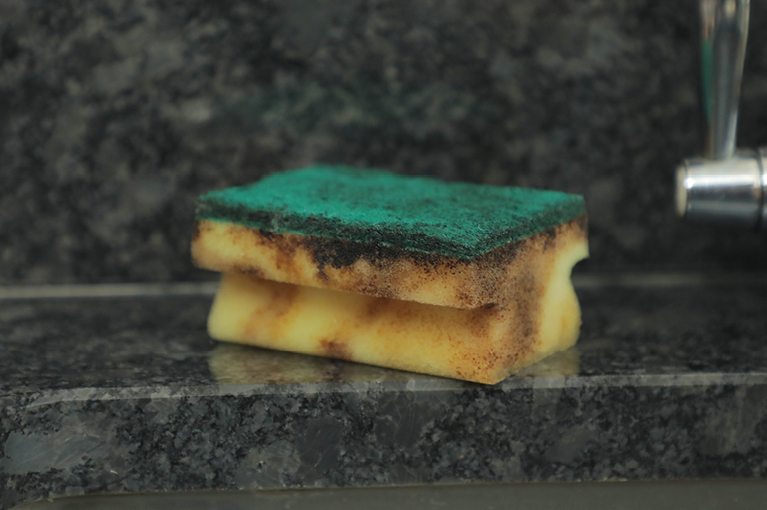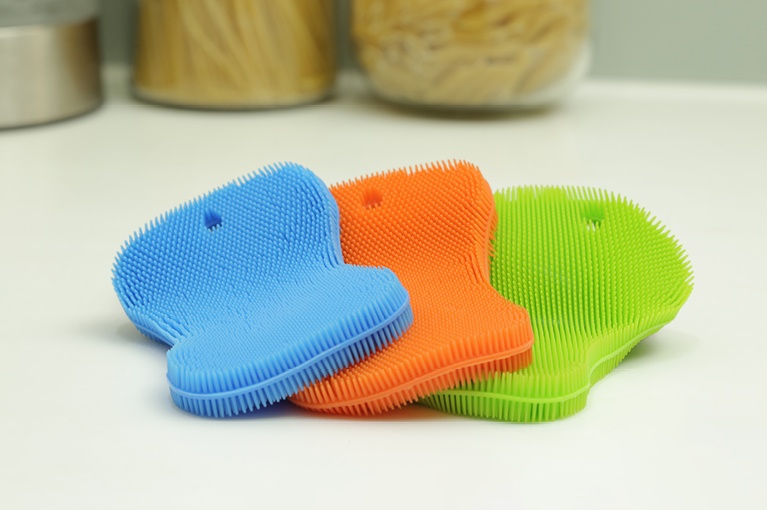Should we all be switching our sponges?
Posted by Amy, 25 August 2020
Regular, trusty, household sponges have been around for decades now, after first being invented by a German scientist back in 1937. Nearly every household kitchen in the UK has one of these sponges, and they are still regularly purchased from supermarkets.
Most homeowners swear by these sponges, but how great are they really?

Made from foamed plastic polymers, kitchen sponges are a very useful utensil for cleaning dishes and surfaces as they retain water and lather up soap well. However, this also makes them a breeding ground for disease-causing bacteria.
One study demonstrated that “kitchen environments host more microbes than toilets” due to kitchen sponges, which, “were proven to represent the biggest reservoirs of active bacteria in the whole house”.
So, while it may appear as though you are cleaning everything thoroughly with these sponges, in reality you could just be spreading harmful bacteria from one surface to another.
So, what is the answer to this?
Many people think that sanitising their sponges is the way forward, simply by immersing them in boiling water or popping them in the microwave for a few seconds to kill any harmful bacteria.
In reality, this can often have the opposite effect and PROMOTE the growth of certain types of bacteria instead.
The study in Scientific Report found that “sponge sanitation methods appear not sufficient to effectively reduce the bacterial load in kitchen sponges and might even increase the shares of RG2-related bacteria”.
Their suggested solution to this issue is instead, to regularly replace sponges – they advise on a weekly basis.
As most kitchen sponges are cheap and affordable, this seems like a reasonable solution. However, the lasting impact this method will have on the environment is severe. As these sponges are made from plastic, changing them so regularly will mean a pile up of non-compostable landfill waste.
It can take upwards of 52,000 years for a year’s worth of sponges from one household to decompose. So, starting to dispose of more of these sponges seems like a backwards movement, in the midst of the rest of UK industries trying to turn greener.
So, if regularly replacing kitchen sponges isn’t the answer to this issue, then what is?
Scientists and companies are now in the process of bringing out alternative sponges made from different materials, that are more sanitary and better for the environment.
Whilst some of these options are slightly more expensive than regular kitchen sponges, the benefit of them is that they last much longer so you aren’t having to replace them every week.

Silicone sponges
One such example of an alternative sponge material is silicone. Silicone sponges are much more sanitary than regular sponges as they are not porous and usually have hundreds of silicone bristles, which help to protect from bacteria.
This also means that sanitising Silicone sponges is much more effective at reducing harmful bacteria- whether this is in a dishwasher, microwave or boiling water, and they dry much quicker- which is great news as bacteria thrives in moist areas. Furthermore, silicone sponges will stay intact and useful for much longer than regular sponges so as a result you won’t need to be replacing them anywhere near as regularly.
Brittney Morgan tested silicone sponges and found that while the silicone choice doesn’t hold soap as well as a regular sponge, they are great for scrubbing surfaces and sinks.
Also, as an added bonus, silicone sponges have many more uses than simply cleaning dishes and surfaces!
They can also be used for:
Cleaning make up brushes
Oven protection
Wiping up fluff and lint
As a trivet
Washing vegetables
And opening jars
Meaning that you really are getting your money's worth!
Other sponges
There are also several other eco-friendly and more sanitary options available on the market currently, and there are sure to be many more released in the next few years as companies continue to look to more eco-friendly alternatives!
You can buy a pack of three Hygiene Hero silicone sponges by clicking here
Amy x
Founder, Must Have Ideas Ltd

Amy, Founder
Amy started the company in 2018, with a mission to bring exciting, 'must have' products to home across the UK.
She is passionate about making home life as easy as possible.



